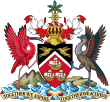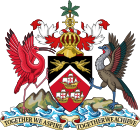
The politics of Trinidad and Tobago function within the framework of a unitary state regulated by a parliamentary democracy modelled on that of the United Kingdom of Great Britain and Northern Ireland, from which the country gained its independence in 1962. Under the 1976 republican Constitution, the monarch was replaced as head of state by a President chosen by an electoral college composed of the members of the bicameral Parliament, consisting of the Senate and the House of Representatives.
President of the Senate is a title often given to the presiding officer of a senate. It corresponds to the speaker in some other assemblies.

Patrick Augustus Mervyn Manning was a Trinidadian politician who was the fourth prime minister of Trinidad and Tobago; his terms ran from 17 December 1991 to 9 November 1995 and from 24 December 2001 to 26 May 2010. He was also the political leader of the People's National Movement (PNM) from 1987 to 2010. A geologist by training, Manning served as Member of Parliament for the San Fernando East constituency from 1971 until 2015 when he was replaced by Randall Mitchell, but with the seat in 2020 being won by his son Brian Manning. Patrick Manning was the longest-serving member of the House of Representatives. He was the Leader of the Opposition from 1986 to 1990 and again from 1995 to 2001.

The president of the Republic of Trinidad and Tobago is the head of state of Trinidad and Tobago and the commander-in-chief of the Trinidad and Tobago Defence Force. The office was established when the country became a republic in 1976, before which the head of state was the Queen of Trinidad and Tobago, Elizabeth II. The last governor-general, Sir Ellis Clarke, was sworn in as the first president on 1 August 1976 under a transitional arrangement. He was formally chosen as president by an electoral college consisting of members of both houses of Parliament on 24 September 1976, which is now celebrated as Republic Day.

The People's National Movement (PNM) is the longest-serving and oldest active political party in Trinidad and Tobago. The party has dominated national and local politics for much of Trinidad and Tobago's history, contesting all elections since 1956 serving as the nation's governing party or on four occasions, the main opposition. It is one out of the country's two main political parties. There have been four PNM Prime Ministers and multiple ministries. The party espouses the principles of liberalism and generally sits at the centre to centre-left of the political spectrum.

The Tobago House of Assembly (THA) is a unicameral devolved legislative body responsible for the island of Tobago within the unitary state of Trinidad and Tobago. The THA was re-established in 1980 to rectify some of the disparities in the relationship between the two islands; a prior body of the same name existed from 1768 to 1874. In addition to the normal local government functions, the THA handles many of the responsibilities of the central government, but has limited ability to collect taxes and to impose local law or zoning regulations. At the helm of the Assembly Legislature is the Presiding Officer with the fifteen elected assemblymen, and four appointed councillors. Three of the councillors are appointed on the advice on the Chief Secretary and one on the advice of the Minority Leader. The Chief Secretary is the leader of the majority party in the assembly and is at the helm of the Executive arm of the THA.

Trinidad and Tobago elects its House of Representatives on the national level. The head of government, the prime minister, is chosen from among the elected representatives on the basis of his or her command of the support of the majority of legislators. The Parliament of the Republic of Trinidad and Tobago has two chambers. The House of Representatives has 41 members, elected for a maximum five-year term in single-seat constituencies. The Senate has 31 members: 16 government senators appointed on the advice of the prime minister, six opposition senators appointed on the advice of the leader of the opposition and nine so-called independent senators appointed by the president to represent other sectors of civil society. The president is elected for a five-year term by an electoral college consisting of the members of both houses of Parliament. Other elected bodies include the local government bodies in Trinidad and the Tobago House of Assembly, which handles local government in the island of Tobago and is entrenched in the constitution.

The House of Representatives is the elected lower house of the bicameral Parliament of Trinidad and Tobago, along with the President and Senate of Trinidad and Tobago. The House of Representatives sits at the Red House. It has 41 members, each elected to represent single-seat constituencies. The Parliament is elected with a five-year term, but may be dissolved earlier by the President if so advised by the Prime Minister.
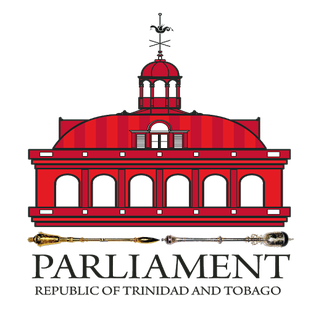
The Parliament of Trinidad and Tobago is the legislative branch of the Government of Trinidad and Tobago. The Parliament is bicameral. Besides the President of Trinidad and Tobago, it is composed of the House of Representatives, which is composed of the Speaker of the House of Representatives in addition to 41 directly elected members serving a five-year term in single-seat constituencies, and the Senate which has 31 members appointed by the President: 16 Government Senators appointed on the advice of the Prime Minister, 6 Opposition Senators appointed on the advice of the Leader of the Opposition and 9 Independent Senators appointed by the President to represent other sectors of civil society. It is at present the only parliament in the world with an incumbent female President, President of the Senate, Speaker of the House of Representatives and Leader of the Opposition and made history by appointing the Caribbean's first and only transgender parliamentarian on 15 February 2022. As of 20 April 2021, there are only 24 female members, or 32.9% and eight members born in Tobago or 11.0%.

The Democratic Labour Party was the main opposition party in Trinidad and Tobago from 1957 till 1976. That party was the party which opposed the People's National Movement (PNM) at the time of Independence. After several splits brought about by leadership struggles, the party lost its hold on the Indo-Trinidadian community in the 1976 General Elections and was displaced in parliament by the United Labour Front under the leadership of Basdeo Panday, a former DLP senator. The party was the representative of the ethnic Indian community in the country; however Indian Muslims and Christians were said to be less loyal to the party than Indian Hindus.

Trinidad and Tobago is divided into seven regions, five boroughs, two city corporations and one ward.
The West Indies Democratic Labour Party (DLP) or Democrats was one of two Federal parties in the short-lived West Indies Federation, the other being the West Indies Federal Labour Party (WIFLP). The party was organised by Sir Alexander Bustamante to counter the WIFLP led by his cousin Norman Manley. In the 1958 West Indies federal elections, the party lost, winning 19 of the 45 seats in the Federal Parliament of the West Indies Federation.
George F. Fitzpatrick (1875–1920) was a prominent barrister of Indian descent and member of Trinidad & Tobago's Legislative Council. He played an early role in helping bring to light malpractices carried out under the system of Indian indentured labour. In 1909, George Fitzpatrick provided testimony before a British parliamentary investigation, led by Lord Sanderson, regarding alleged mistreatment of East Indian labourers living in Trinidad. The Sanderson Committee, however, failed to bring about the immediate abolition of the indentured system, only its postponement, which was further deferred by the onset of the First World War. It was not until January 2, 1920, that the system of indentured labour would come to an end. George F. Fitzpatrick's son, Hon. George Fitzpatrick, trained as a solicitor and served a three-year term as member of parliament, representing the district of San Fernando. Following the death of his first wife during childbirth, Hon. George Fitzpatrick married Phyllis Sinanan, sister of Mitra and Ashford Sinanan, uniting the Fitzpatrick family with another prominent political family of Trinidad (see Ashford Sinanan, Ambassador, Leader of the Opposition, Democratic Labour Party, West Indies Federation, founder of the West Indian National Party and High Commissioner to India. See also M. Sinanan, Constitution Commission of Trinidad and Tobago, presented to His Excellency Sir Ellis Clarke, Commander-in-Chief of Trinidad and Tobago, January 22, 1974.
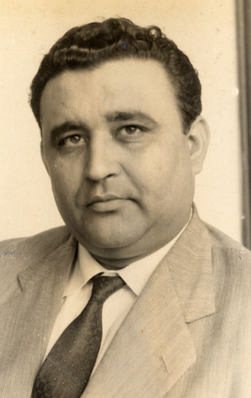
Ashford Sastri Sinanan was a politician from Trinidad and Tobago who served in various roles prior to and following Trinidad and Tobago’s independence in 1962. Along with his brother, Mitra, Sinanan helped draft portions of Trinidad’s constitution and later went on to serve as the country’s first High Commissioner to India. High office, however, ultimately eluded him: first, in his 1958 bid to become the first Prime Minister of the Federation of the West Indies, a contest that he narrowly lost by 2 seats to Barbados’ Sir Grantley Adams; and second, in 1974, when he resigned from his post as High Commissioner to India to found the West Indian National Party (WINP). The WINP ultimately failed to break the 20-year rule of then Prime Minister, Eric Williams.
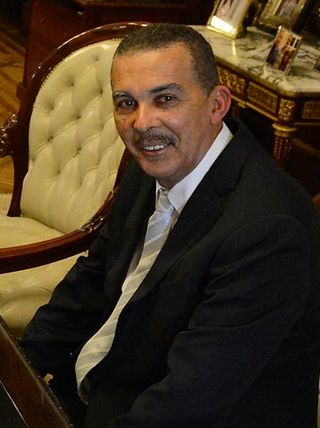
Indirect presidential elections were held in Trinidad and Tobago on 15 February 2013.

Federal elections were held in the West Indies Federation for the first and only time on 25 March 1958. The result was a victory for the West Indies Federal Labour Party, which won 25 of the 45 seats in the House of Representatives.

Bridgid Annisette-George is a Trinidadian lawyer and politician. She has been the Speaker of House of Representatives of Trinidad and Tobago since 2015, the second female to hold the position and currently the world's second longest female incumbent to consecutively hold the office of Speaker. She previously served as a Senator and the third female Attorney General of Trinidad and Tobago for the PNM before resigning to return to her private law practice.

Indirect presidential elections were held in Trinidad and Tobago on 19 January 2018.
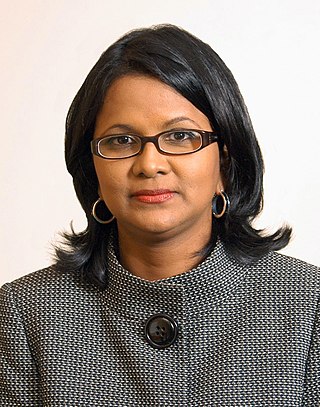
Indirect presidential elections were held in Trinidad and Tobago on 20 January 2023.
